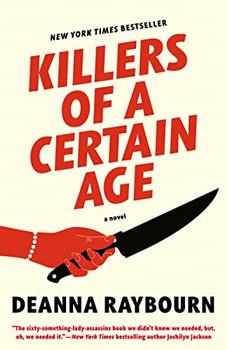Summary | Excerpt | Reading Guide | Reviews | Beyond the book | Read-Alikes | Genres & Themes | Author Bio

Killers of a Certain Age by Deanna Raybourn begins with a situation familiar to action lovers. Four female assassins are betrayed by their organization, for no apparent reason. Now, to survive, they must fend off (and kill) their former colleagues who have been sent to kill them, uncover (and kill) whoever at the organization is behind the setup, and expose the truth.
Put another way, the women's eyes have been opened vis a vis their employer: They have been treated as dispensable; they have been underestimated; they will not be silent. So the classic action plot becomes a feminist workplace revenge fantasy. The title and early pages of Killers of a Certain Age imply that the novelty of the book will be the challenge the assassins' age poses to their mission—60 years old, recently retired, knees creaking, how could they kill anyone? But aside from the perfunctory and largely inconsequential descriptions of body aches and knitting, the real significance of the four protagonists' age is that they are women of an older generation who have begun, in the wake of #MeToo, to reevaluate their former workplace conditions. Frequent flashbacks to missions in the '70s and '80s showcase the harassment and other, subtler indignities endured by women in male-dominated fields—though, for the sake of levity, it's all pretty mild. Their sexist male coworkers deserve what's coming to them—not just because they recently betrayed the women, but because they've disrespected and underestimated them all along. And now the foursome has contemporary feminist knowledge and technology to aid them, like a fake period tracker app that they can use to stealthily communicate because most security agents are men and "most men are terrified of periods."
The constant girl-power references and callouts feel a bit stale and inorganic, but the premise is a good vehicle for an action-mystery-assassin story, and the book delivers on everything we might want: Tricks of the trade (if you're disoriented underwater, breathe out and then follow the bubbles to the surface; soak tobacco in water to make poison), a detailed scene of losing a tail in New Orleans' French Quarter, another of escaping bodyguards in the Paris catacombs, an elaborate scheme in Zanzibar to kill one of the few living Nazis. The tension is low, but the mystery remains alive until the last pages.
If the novel feels incomplete in some way, it's because the world Raybourn has created is too black and white. It's hammered home that the women's organization is on the right side of history—their targets are heavily vetted, and it's certain that their deaths make the world a better place—and so the women, who never take outside kill orders, are too. Their male colleagues, on the other hand, care little about the sanctity of the work: They take jobs on the side, with no guarantee they're killing "bad guys," or think selfishly about their own clout and kill counts. In one hilarious exchange, a male assassin, complaining about how one of the women killed a target that he wanted, yells at her, "You took my Nazi!"
In real life, of course, men can often be devoted to good or progressive causes but still be shitty to women, and women, for their part, are not immune to corruption or betrayal just because of their gender. Raybourn has created a funny, exaggerated but believable world that could perfectly showcase the complicated rifts between people's purported values and how they lead their personal lives, but her characters don't quite rise to the challenge. Still, if the book's moral world is a bit simplistic, its plot is not. The women realize early on that they're being used. By whom and for what is the mystery to solve, and it's a good one. But the real question is, as ever: What are they going to do about it?
![]() This review was originally published in The BookBrowse Review in October 2022, and has been updated for the
September 2023 edition.
Click here to go to this issue.
This review was originally published in The BookBrowse Review in October 2022, and has been updated for the
September 2023 edition.
Click here to go to this issue.

If you liked Killers of a Certain Age, try these:

A Serial Killer's Guide to Marriage
by Asia Mackay
Published 2025
Two former serial killers trying to keep their past buried realize that old habits die hard in this "wildly original, razor-sharp thriller" (Chris Whitaker, New York Times bestselling author of All the Colors of the Dark).

by Jean Hanff Korelitz
Published 2024
After the "insanely readable" (Stephen King) and "perfectly told" (Malcolm Gladwell) New York Times bestseller The Plot comes Jean Hanff Korelitz's equally captivating new novel: The Sequel.
People who bite the hand that feeds them usually lick the boot that kicks them
Click Here to find out who said this, as well as discovering other famous literary quotes!
Your guide toexceptional books
BookBrowse seeks out and recommends the best in contemporary fiction and nonfiction—books that not only engage and entertain but also deepen our understanding of ourselves and the world around us.